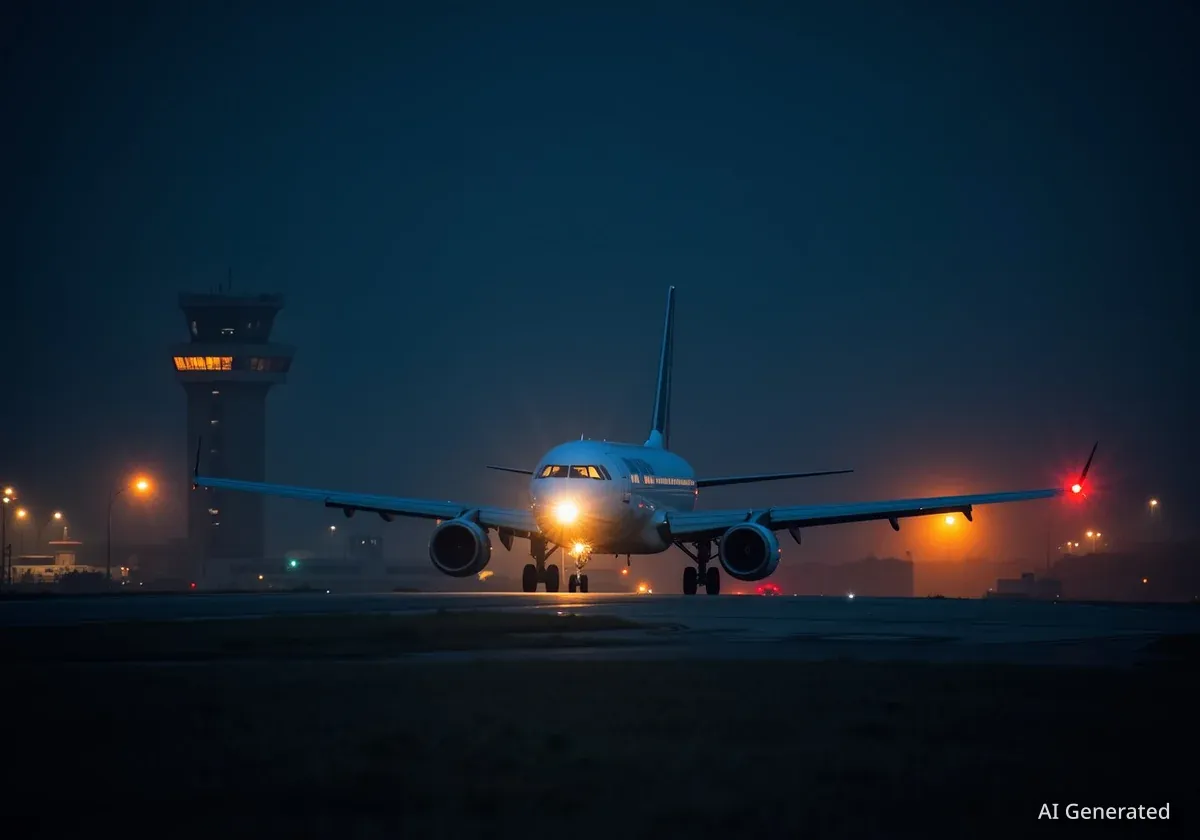A flight from Paris to Ajaccio, Corsica, experienced a significant delay and was forced to circle for an hour after the air traffic controller at Ajaccio Napoléon Bonaparte Airport reportedly fell asleep. The incident occurred early Tuesday morning, leaving the control tower unresponsive and the runway unlit as the Air Corsica Airbus A320 attempted to land.
The pilot maintained communication with passengers throughout the unusual situation, which ultimately led to a delayed but safe landing after airport staff intervened to awaken the controller.
Key Takeaways
- An Air Corsica flight circled for one hour due to an unresponsive air traffic controller.
- The controller at Ajaccio Napoléon Bonaparte Airport was reportedly found asleep.
- The pilot contacted airport fire services after failing to reach the control tower.
- The runway lights were activated after the controller was awakened, allowing a safe landing.
- The controller tested negative for drugs and alcohol following the incident.
Flight Approaches Unresponsive Airport
The Air Corsica Airbus A320 departed from Paris' Orly Airport and began its descent towards Ajaccio Napoléon Bonaparte Airport just after midnight. As the aircraft approached, the flight crew attempted to establish contact with the airport's control tower. However, all radio calls went unanswered.
With no response from air traffic control, the pilot took immediate action. He contacted the airport's fire department, informing them of the situation. The fire department then alerted local police authorities.
This critical communication failure meant the runway lights, essential for a safe nighttime landing, remained off. The aircraft continued to circle above the airport while ground teams worked to resolve the issue.
Pilot Informs Passengers During Delay
Throughout the extended holding pattern, the captain kept the passengers informed about the unexpected delay. The pilot reportedly maintained a calm demeanor, attempting to ease any concerns on board.
"We did a little sightseeing," the pilot reportedly joked to passengers, according to Corse Matin. "In my decades of experience, I've never had to deal with a situation like this."
Passengers were assured there was no panic, despite the unusual circumstances. The pilot's communication helped manage the situation inside the cabin as the team on the ground worked to gain access to the control tower.
Incident Details
- Airline: Air Corsica
- Aircraft: Airbus A320
- Route: Paris Orly (ORY) to Ajaccio (AJA)
- Date: Tuesday, early morning
- Delay: 1 hour and 18 minutes behind schedule
Accessing the Control Tower
Authorities on the ground faced challenges in reaching the air traffic controller. Security locks on the control tower's doors delayed access for airport staff and police. This added to the time the plane spent circling.
Eventually, staff managed to enter the control tower. They found the air traffic controller asleep at his desk. After being awakened, the controller promptly activated the runway lights, clearing the way for the aircraft to land.
The plane landed safely on the illuminated runway. The entire incident resulted in the flight landing one hour and 18 minutes behind its scheduled arrival time. The flight had already departed Paris 27 minutes late.
Air Traffic Control Protocol
Air traffic controllers play a vital role in flight safety, guiding aircraft during takeoff, landing, and through controlled airspace. Their constant vigilance and communication are critical for preventing accidents and ensuring efficient air travel. Regulations are strict regarding their duty hours and rest periods to prevent fatigue-related incidents.
Post-Incident Investigation
Following the event, the air traffic controller underwent testing for drugs and alcohol. The results of these tests came back negative. This indicates that substances were not a factor in the controller's inability to respond.
Investigations into the incident are likely to focus on the circumstances that led to the controller falling asleep during their shift. Such events are rare and typically trigger comprehensive reviews of operational procedures, staffing levels, and controller welfare.
The safety of air travel relies heavily on the consistent performance of all personnel involved, from pilots to ground staff and air traffic controllers. This incident highlights the critical importance of maintaining vigilance in all aspects of aviation operations.
Impact on Airport Operations
While the flight landed safely, the event caused operational disruptions. An hour of circling fuel burn and the delay for passengers are direct consequences. Such incidents can also raise questions about airport staffing and emergency response protocols.
Airports and regulatory bodies continuously review safety measures to prevent recurrences. The goal is to ensure that all flights can operate without unexpected delays or safety concerns caused by human error or system failures.





